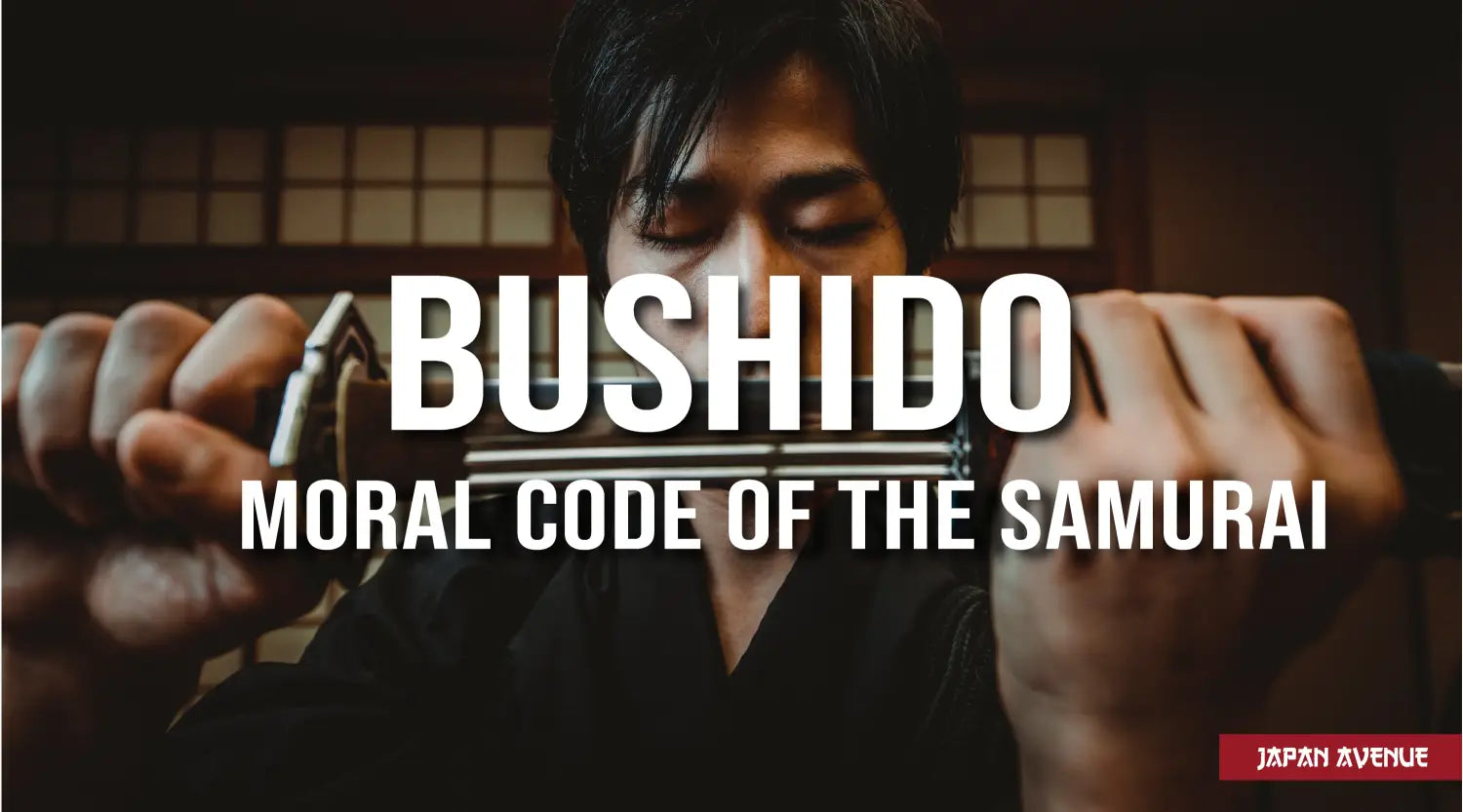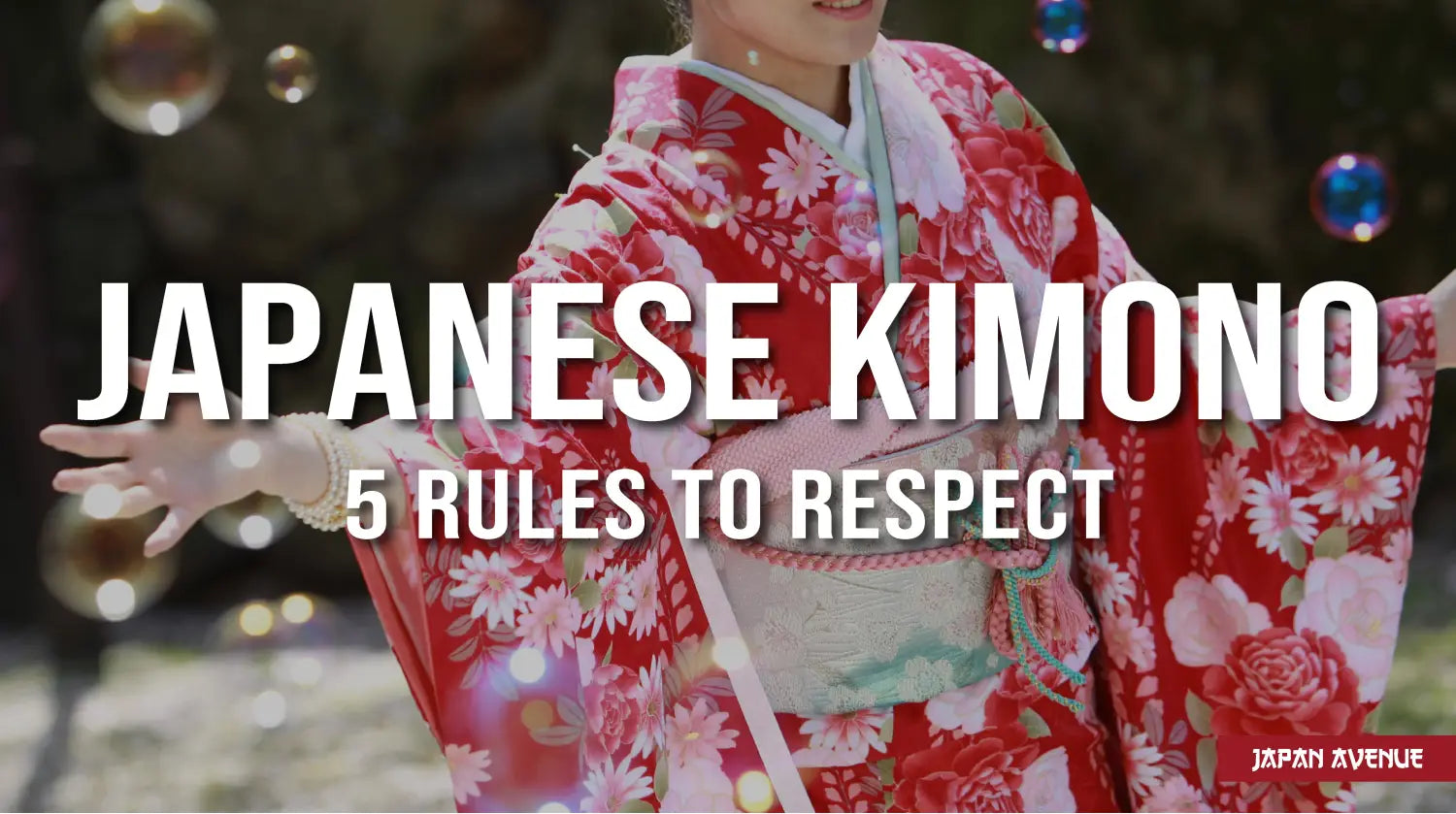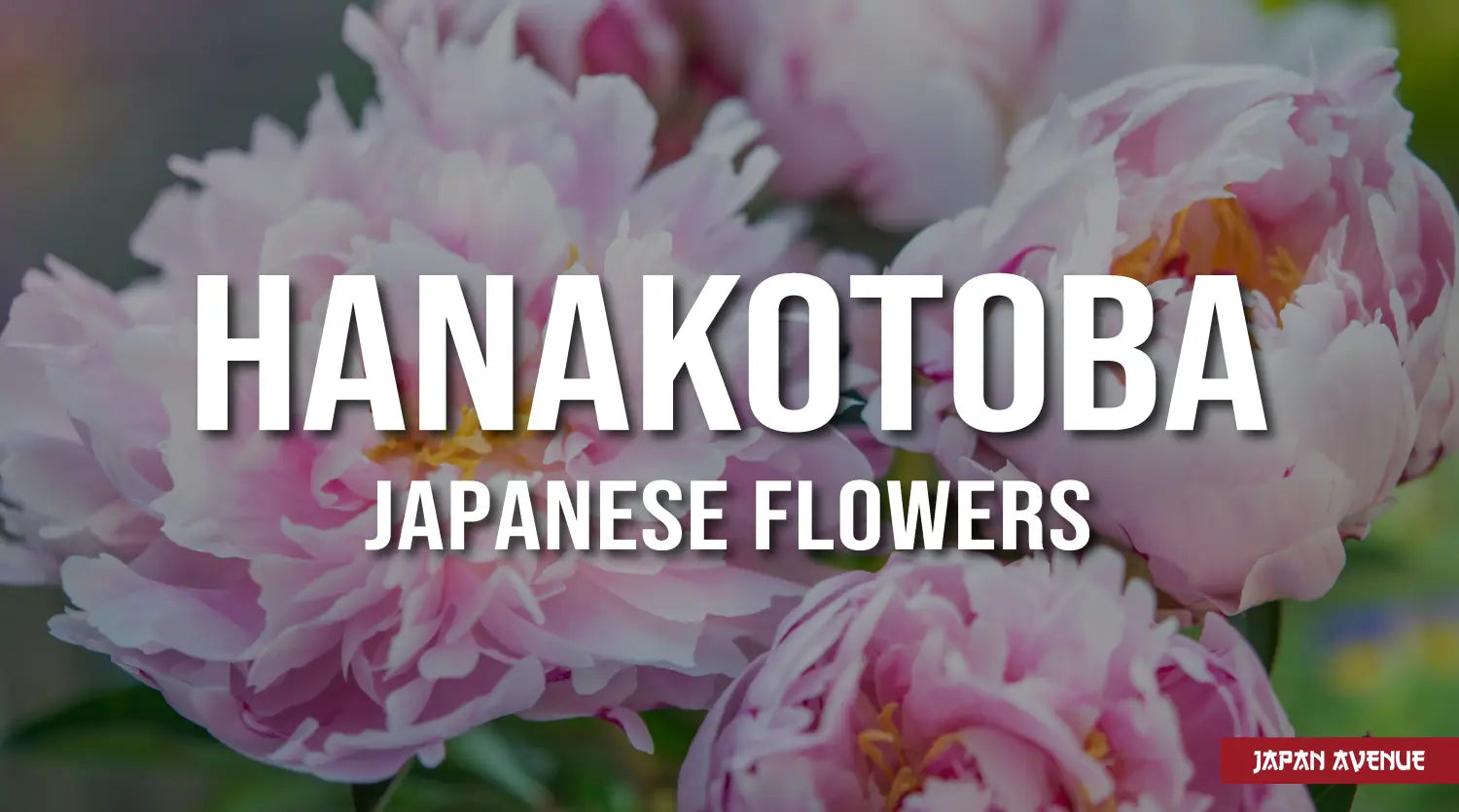Since feudal Japan, Bushido has remained the way of the warrior. This code of conduct, which was the spearhead of the samurai, has permeated Japanese culture much more than it might appear.
Bushido is a set of moral rules that Japanese warriors had to follow. This ethical code, based on several fundamental values such as honor and loyalty, ruled their lives until their death.
If you are a martial arts movie fan, you probably formed a stereotypical image of the Japanese samurai. According to the public imagination, the samurai is a warrior refined in his way of living and fighting, violent towards his opponents and adept of seppuku (hara-kiri or ritual sacrifice). In reality, this warrior is guided by a code of conduct and a spirituality specific to his caste.
Discover the origins of this code of honor, its 7 essential virtues as well as its role in the mindset of the samurai and within the Japanese society.🤔
🤔 What is the Bushido?
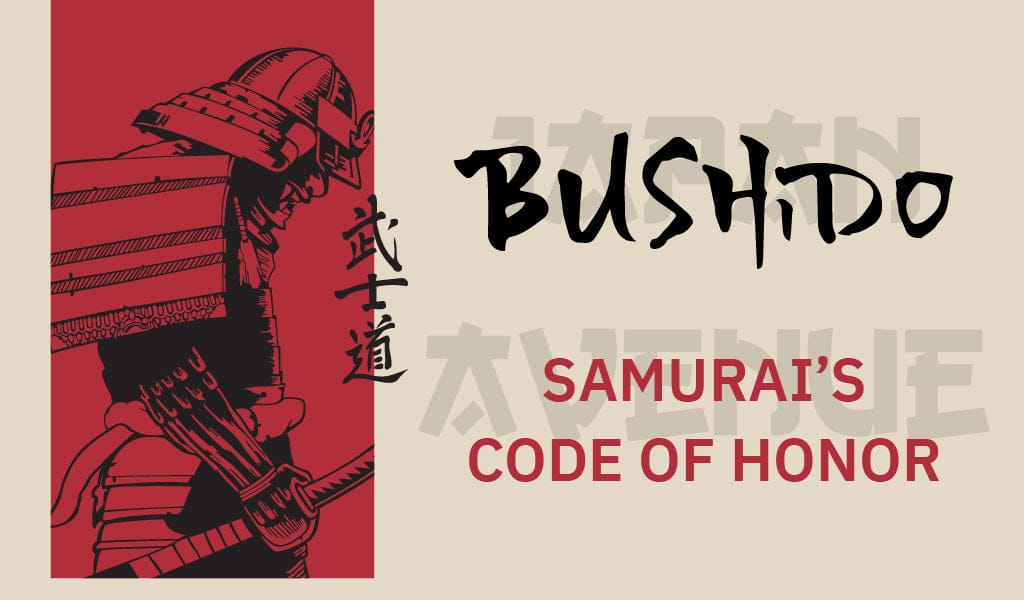
A Japanese term derived from the Chinese "wu shi dao" which literally means "the way of the warrior".
How about a little Japanese lesson?
The prefix "Bu" refers to all martial practices; "Shi" stands for "warrior" while the suffix "do" means "the way".
Although the word "honor" does not appear anywhere, this virtue is the base of the Bushido code. Thus, the seasoned warrior was not only distinguished by his mastery of the bow, sword and hand-to-hand combat techniques, but also by his dignified behavior no matter what the situation.
This characteristic ethical and spiritual side of Japanese warriors has been attributed to influences from Shintoism, Zen Buddhism and Confucianism.
⛩ Sources of Samurai ethics
The warrior's ethical code was not an ex-nihilo creation of the warlords who ruled in the feudal era. They certainly sublimated it to their convenience, but they drew on the religious and philosophical beliefs of ancient Japan. Moreover, it was in times of peace that this moral code was emphasized, enriched and inculcated to the valiant martial arts experts who were "unemployed".
While they continued to develop their combat techniques through their trainings, they started to give equal interest to their spiritual development, especially through the practice of Zen and meditation. Bujutsu (martial practice with a fighting purpose) gave way to Botu (spiritual development through martial practice). The samurai thus acquired his legendary reputation as an invincible fighter, but also as a refined personality.

Shintoism, Buddhism and Confucianism
The first influences are attributed to Shintoism - the ancestral religion of Japan - which cultivates national unity. Shintoism places the family at the center of social life and worships parents and ancestor spirits. However, to remain part of the family lineage, even in the afterlife, death must be dignified and honorable.
Zen Buddhism, considered as the religion of the samurai ever since the Kamakura era, has enlightened the way of the warrior by refining his morality, his sociability and spirituality. Seeking inner peace, harmony and perfection of the soul are its precepts.
Lastly, Confucianism shaped the mentality of the warriors by bringing certain values such as loyalty, fidelity, righteousness and benevolence, which are particularly present in the samurai caste. Remember that samurai had to serve their lord until death...
Those spiritual qualities integrated by the samurai bring happiness and tranquility to both the people and the lords (daimio): total respect for hierarchy and authority, unfailing commitment and loyalty, generosity to the needy, compassion for the vulnerable, thirst for culture, arts and justice.
🔑 7 essential principles of Bushido
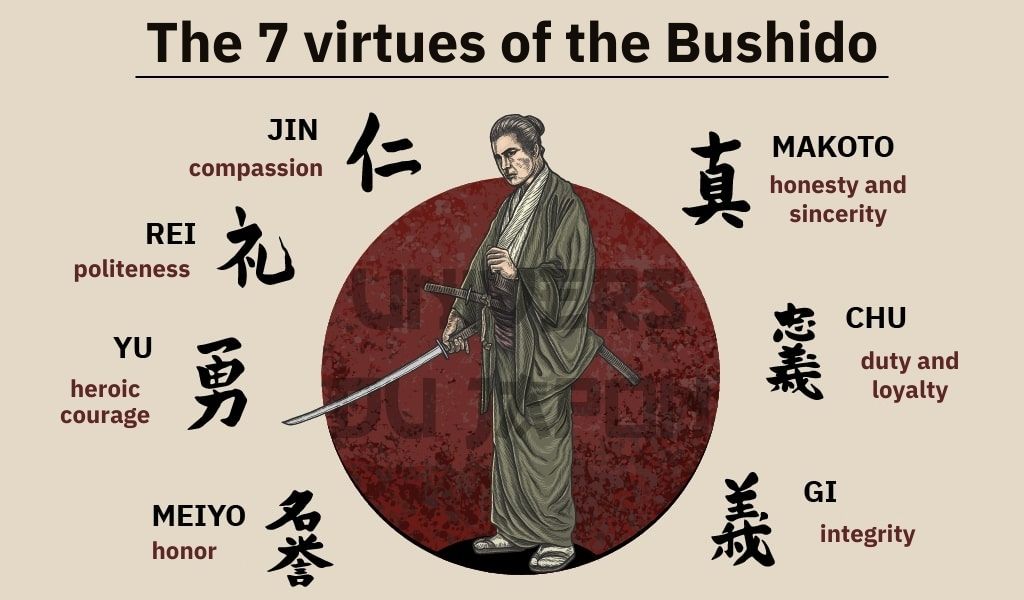
In its reference book "Bushido, the soul of Japan", Inazo Nitobe has identified 7 essential virtues associated to the samurai's code of honor.
Gi: Integrity and sense of duty
The warrior should be rigorous and carry out his mission with justice.
Yu: Heroic courage
Courage is not blind; it is guided by prudence, self-control, intelligence and confidence in own strength..
Jin: Benevolence and compassion
The power acquired through intense training must be used for the benefit of all. Empathy is a formidable force in combat.
Rei: Politeness and respect
A samurai is always courteous no matter what. His inner strength and ferocity are revealed at the right time.
Makoto: Sincerity and truth
Action goes along with one's word. Honesty is the basis of all human relationships and a sign of respect. The lack of sincerity plunges the warrior into dishonor.
Meiyo : Honor
A samurai is the only judge of his honor and does not hide his face. He performs his duty according to ethical principles.
Chugi or chu: Duty and loyalty
An honorable warrior owes unfailing loyalty to his lord to whom he pledges his loyalty until death.
🏹 Bushido and Samurais

The Samurai shaped the history of Japan. Even more so, the history of Japan has shaped and dictated the Samurai mindset. Two major events helped to raise the warriors' ethical code to its zenith: the gradual adoption of Zen practices (rinzai and soto) and the rise to power under the Tokugawa shogunate in 1603 (a period of lasting peace).
The impact of Confucianism, Buddhism and Shintoism are important and recognized by historians, but it is the practice of Zen that would have allowed the samurai to perfect their martial techniques and soften their behavior. Concentration reinforces the precision of the gesture (handling of weapons), the detachment from the material guarantees incorruptibility and spiritual awakening engenders compassion.
Without the peace imposed by the Tokugawa lineage, the destiny and the path of the samurai would certainly have been different. Reconversions occurred: martial arts masters, artists and intellectuals, managers, bandits, wrongdoers, etc. Martial arts were brought to the top in schools as well as the spiritual elevation.
Other wars followed, with their cultural consequences (westernization, etc.), but the ethical code of the warriors resisted.
🥋 Samurai code and Japanese society

For a foreign visitor, Japan is a land of contrasts: ancestral rituals and high technology, restraint and extravagance, traditions and modernity.
The modern Japanese society (apparently westernized) has never forgotten its Samurai heritage. Quite the contrary, they draw strength from it in difficult times, as was the case for the army during the Second World War (kamikaze pilots are the best known example).
The Japanese school system and the corporate world also bear witness to the continuing impact of the principles of the samurai's code of honor on modern Japanese society. Thus, values universally attributed to Japanese students and businessmen are said to have their origin in the ethical code of warriors: the quest for excellence, respect for instructions and hierarchy, fighting spirit, collective work, precision in gesture and organization, discretion, love for arts - values inspired by the Bushido.
The commercial success of books and movies about Japanese samurai as well as the development of new martial arts schools confirm that young Japanese people treasure the spiritual and martial legacy of their ancestors.
The characteristic of great civilizations, cultures, and religions is to resist time, events, and boundaries created by man. This is exactly the way the samurai's code of ethics is. Inspired by the ancient religious currents of the Land of the Rising Sun, it drew its moral values straight from them. The benefit was twofold: a greater martial perfection and an exemplary social integration. Also for today's Japan!
You now know that the Bushido is not limited to simple warrior principles. Beyond the ethical code, a true philosophy follows.
The way of the warrior allows the elevation of the body and the spirit, through learning and spirituality. More than a code of conduct, Bushido has become a reference in Japanese martial arts.
Learn more:

